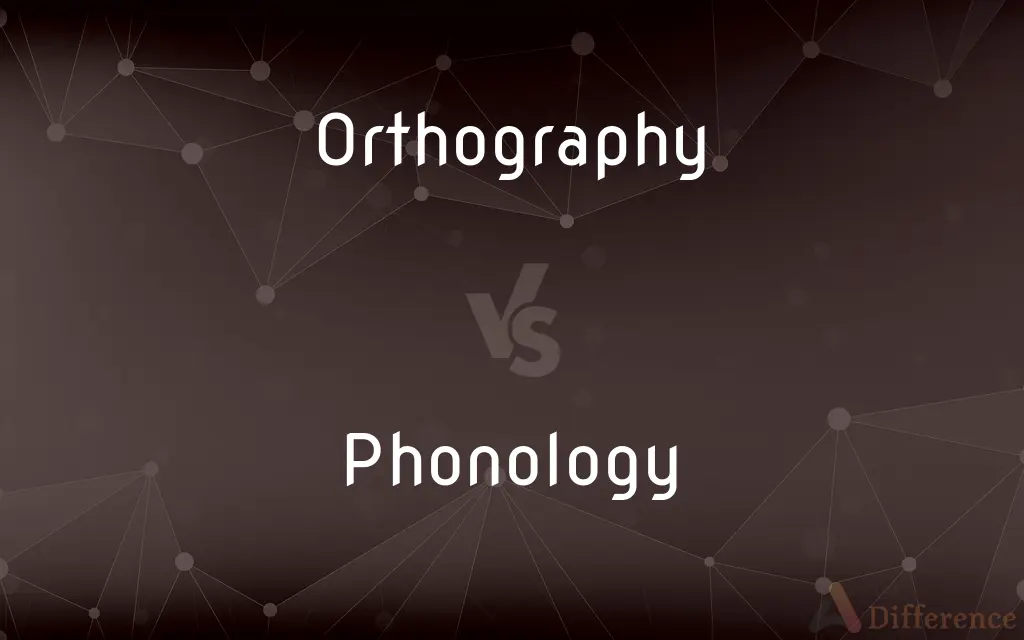Orthography vs. Phonology — What's the Difference?
By Maham Liaqat & Fiza Rafique — Updated on April 18, 2024
Orthography refers to the set of conventions for writing a language, including spelling and punctuation, whereas phonology studies the sound system of a language, including the organization of sounds.

Difference Between Orthography and Phonology
Table of Contents
ADVERTISEMENT
Key Differences
Orthography is the standardized system of writing in a language, focusing on rules of spelling, punctuation, and the usage of characters. Whereas phonology deals with the study of how sounds function within a particular language, including phonemes, stress, and intonation.
Orthographic systems can vary significantly between languages; for example, English orthography includes a complex set of rules that often lead to irregular spellings. On the other hand, phonology covers the abstract aspects of sounds in language and is concerned with patterns and variations in spoken sounds across different contexts.
Orthography is often deeply influenced by the history and culture of a language, incorporating elements from different languages and periods. Phonology, on the other hand, focuses on the systematic organization of sounds and how they are perceived and produced by speakers.
While orthography is primarily concerned with the visual representation of language, phonology addresses the auditory and cognitive aspects of sounds and how they are used to encode meaning.
The relationship between orthography and phonology is crucial in literacy, as learners must understand how spoken sounds relate to written symbols. Whereas phonological awareness is a key component in acquiring reading skills, particularly in recognizing the phonemic structures of words.
ADVERTISEMENT
Comparison Chart
Focus
Writing system, including spelling and punctuation
Sound system of a language
Rules
Governed by conventions of spelling and character use
Deals with rules of sound patterns, stress, and intonation
Variation
Varies widely between languages and is influenced by historical changes
Relatively consistent within a language but varies phonetically across languages
Study Area
Concerned with visual form of language
Focuses on auditory and abstract aspects of speech sounds
Relevance in Literacy
Essential for reading and writing accuracy
Crucial for developing phonemic awareness and decoding skills
Compare with Definitions
Orthography
The aspect of language study concerned with letters and their correct sequence in words.
Orthography is a fundamental component of literacy education.
Phonology
The study of the distribution and patterning of speech sounds in a language and the rules for their pronunciation.
Phonology examines how different sounds function in a language.
Orthography
A method of representing the sounds of a language by written or printed symbols.
English orthography does not always faithfully represent phonological sounds.
Phonology
The system of relationships among the speech sounds that constitute the fundamental components of a language.
Understanding phonology is essential for learning a new language.
Orthography
A set of conventions for writing a language.
Orthography includes rules on punctuation, capitalization, and spelling.
Phonology
The branch of linguistics that deals with systems of sounds, especially in particular languages.
Phonology covers both the study of phonetic sounds and their abstract theoretical aspects.
Orthography
The collective term for the symbols used in writing a language.
The orthography of ancient scripts often requires specialized study to understand.
Phonology
The study of phonemes and their organization within a language.
Phonological rules dictate how phonemes are combined and pronounced.
Orthography
An orthography is a set of conventions for writing a language, including norms of spelling, hyphenation, capitalization, word breaks, emphasis, and punctuation. Most transnational languages in the modern period have a system of writing, and for most such languages a standard orthography has been developed, often based on a standard variety of the language, and thus exhibiting less dialect variation than the spoken language.
Phonology
The analysis of the sound system of a language including intonation, stress, and pitch.
Japanese phonology includes distinctive pitch accents that alter the meaning of words.
Orthography
The art or study of correct spelling according to established usage.
Phonology
Phonology is a branch of linguistics that studies how languages or dialects systematically organize their sounds (or signs, in sign languages). The term also refers to the sound system of any particular language variety.
Orthography
The aspect of language study concerned with letters and their sequences in words.
Phonology
The study of speech sounds in language or a language with reference to their distribution and patterning and to tacit rules governing pronunciation.
Orthography
A form of projection used to represent three-dimensional objects in two dimensions, in which all the projection lines are orthogonal or perpendicular to the projection plane; an orthographic projection, especially when used to draw an elevation, vertical projection, etc., of a building; also (obsolete) a drawing made in this way.
Oblique projection
Phonology
The sound system of a language
The phonology of English.
Orthography
(linguistics)
Phonology
The study of the way sounds function in languages, including phonemes, syllable structure, stress, accent, intonation, and which sounds are distinctive units within a language.
Orthography
(countable) A method of representing a language or the sounds of language by written symbols; spelling.
Phonology
The way sounds function within a given language; a phonological system.
Orthography
A set of conventions for writing a language, including norms of spelling, capitalization, emphasis, hyphenation, punctuation, and word breaks.
Phonology
The science or doctrine of the elementary sounds uttered by the human voice in speech, including the various distinctions, modifications, and combinations of tones; phonetics. Also, a treatise on sounds.
Orthography
(uncountable) The aspect of language study concerned with letters and their sequences in words; the study of spelling.
Phonology
The study of the sound system of a given language and the analysis and classification of its phonemes
Orthography
(uncountable) Correct spelling according to established usage; also (obsolete) pronunciation according to the spelling of a word.
Orthography
Synonym of orthographer
Orthography
To spell (words) or write (text) according to established usage.
Orthography
The art or practice of writing words with the proper letters, according to standard usage; conventionally correct spelling; also, mode of spelling; as, his orthography is vicious.
When spelling no longer follows the pronunciation, but is hardened into orthography.
Orthography
The part of grammar which treats of the letters, and of the art of spelling words correctly.
Orthography
A drawing in correct projection, especially an elevation or a vertical section.
Orthography
The method of spelling the words of a particular language; the system of symbols used for writing a language.
Orthography
The branch of linguistics concerned with how languages are written.
Orthography
A method of representing the sounds of a language by written or printed symbols
Common Curiosities
What is orthography?
Orthography is the aspect of language that deals with the rules of writing correctly in terms of spelling, punctuation, and capitalization.
How does orthography relate to phonology?
Orthography and phonology are interconnected; orthography represents phonology in written form, though not always perfectly due to historical and cultural influences.
Can the orthography of a language affect its phonology?
Typically, phonology influences orthography, but in some cases, orthographic practices can influence pronunciation, especially in learned words.
What is phonology?
Phonology is the study of the sound system of languages, including how sounds are used and organized in speech.
Are phonological rules the same across languages?
No, each language has its own unique set of phonological rules and sound systems.
Is orthography the same in all English-speaking countries?
No, there are differences, such as American and British English spelling differences.
Why is phonology important in language learning?
Phonology helps language learners understand patterns of sounds, which is crucial for pronunciation and listening skills.
What are examples of orthographic rules?
Examples include rules for capitalization, use of hyphens, and correct spelling.
What does phonology study besides phonemes?
Phonology also studies features like stress, tone, and intonation which are crucial for conveying meaning.
How do orthography and phonology differ in their approach to language?
Orthography is concrete and visual, focusing on written language, whereas phonology is more abstract, dealing with sounds and their patterns.
What role does orthography play in education?
Orthography is crucial in teaching correct spelling and writing, which are fundamental in literacy.
How can knowledge of phonology aid in reading skills?
Phonological awareness can improve decoding skills and reading comprehension.
Can orthography be irregular?
Yes, especially in languages like English where historical spelling is retained despite changes in pronunciation.
How do orthographic errors differ from phonological errors?
Orthographic errors are mistakes in spelling and punctuation, while phonological errors involve incorrect sound production or usage.
What is phonemic awareness?
Phonemic awareness is the understanding that words are made up of phonemes, which aids in reading and spelling.
Share Your Discovery

Previous Comparison
Salvation vs. Deliverance
Next Comparison
Trail vs. TraceAuthor Spotlight
Written by
Maham LiaqatCo-written by
Fiza RafiqueFiza Rafique is a skilled content writer at AskDifference.com, where she meticulously refines and enhances written pieces. Drawing from her vast editorial expertise, Fiza ensures clarity, accuracy, and precision in every article. Passionate about language, she continually seeks to elevate the quality of content for readers worldwide.














































